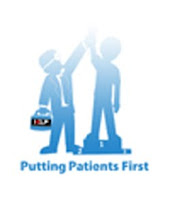To sum up, the following suggestions will help you communicate effectively with your doctor:
1. Plan well ahead of time what you intend discussing with your doctor about your problem. Your own observations about your health problem can prove invaluable in helping the doctor make an accurate diagnosis. Carry written lists to make sure you don't forget any crucial aspects!
2. If you are confused by complex medical terms, ask for simple definitions. There is no need to be embarrassed; after all, your doctor does want you to understand what is happening to you! Remember that your doctor's objectives and yours are the same to help you to get better as soon as possible!
3. Repeat in your own words what you think the doctor meant and also ask: 'Is my version correct?' Such a clarification will ensure that you understand clearly what the doctor is saying and will also allow him to present the information to you again, if required, in a manner which you can comprehend.
4. Share your point of view with your doctor since he needs to know what's working and what's not. He or she obviously can't read your mind, so it is important for you to put across your thoughts and observations. If you feel rushed, worried, or uncomfortable, do convey your apprehensions to the doctor. Try to voice your feelings in a positive and courteous manner. For example: "I know you have many patients to see, but I'm really worried about my condition. I'd feel much better if we could talk about it a little more.' If necessary, you can offer to return for a second visit to discuss your concerns.
5. Take notes on what the doctor's analysis of your problem is and what you need to do to rectify the situation.
6. Discuss frankly with your doctor if any part of the visit has been annoying or dissatisfactory, such as a lengthy waiting time or discourteous staff. Your approach ought to be tactful, but honest.
7. Don't hesitate to voice your apprehensions about what you may have heard from well-meaning but ill-informed friends or relatives regarding your condition. The doctor may be able to dispel any misconceptions.
8. Discuss any self-medication practices you've used which have relieved symptoms.
9. Don't waste your doctor's time by asking irrelevant questions (for example, about your brother-in-law's medical problem). Such a digression is likely to upset the doctor! Also, try to do as much homework as possible, so that you can ask your doctor questions specific to your particular problem. After all, if you can find the answers to your questions from another source, say, a book or by asking the nurse or receptionist, you can save your doctor's precious time, something which he will deeply appreciate. You can, nevertheless, ask your doctor to confirm that the knowledge you have acquired is accurate!



No comments:
Post a Comment